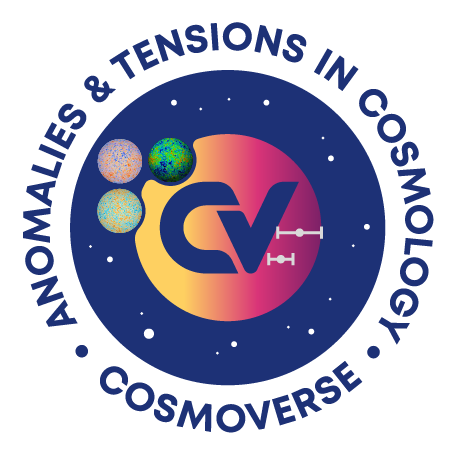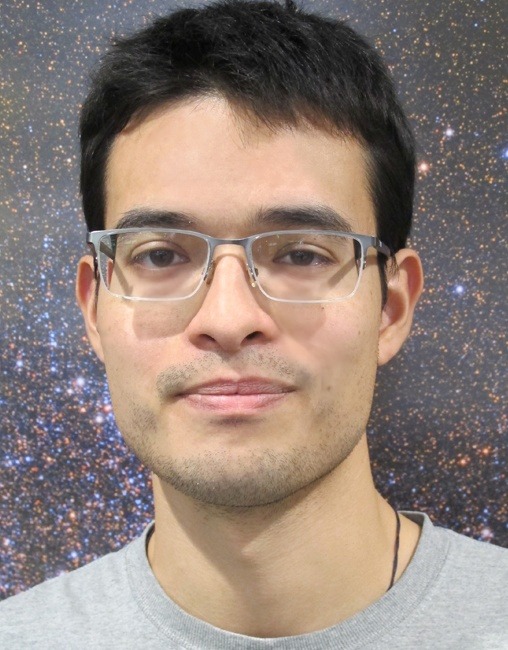What is your name, affiliation, academic position, and job title?
Sunny Vagnozzi, currently a tenure-track Assistant Professor at the University of Trento, in Italy. As a caveat, some years ago I answered similar questions in an interview for EuCAPT https://www.eucapt.org/post/community-profile-sunny-vagnozzi, so some answers may well be similar!
What is your journey? (Where did you live, learn and work?)
I was born in Latina, a town in Central Italy, not far from Rome. I spent roughly half of my early years there and the other half a bit further down South, in a town called Terracina. I then moved up North to Trento for my undergraduate studies during 3 years, and after that I lived for 6 months in London, UK (as an exchange student at Imperial College), 2 years in Melbourne, Australia for my Master’s studies, 9 months in Copenhagen (where I was a long-term visitor at the Niels Bohr Institute), 4 among the best years in my life in Stockholm, Sweden (a fantastic place! If you ever have the chance of living there, I do recommend to grab on the opportunity!) where I did my PhD at Stockholm University, and 3 years in Cambridge, UK as a postdoc at the University of Cambridge. Finally, in 2022 I returned back to Trento, Italy, as an Assistant Professor at the University of Trento, where my journey in physics began.
What is your field of research and/or what project are you involved in?
Broadly speaking, my field of research lies in between cosmology and astroparticle physics. I try and build models which well describe the Universe, and conversely use data to inform this model-building activity. In general I get my hands dirty both analysing data and doing pen-and-paper calculations, roughly split 50%-50%.
Briefly describe your career trajectory to date. What positions have you held, when and where?
2009-2012: BSc in Physics, University of Trento
2013-2014: MSc in Physics, University of Melbourne
2015-2019: PhD in Theoretical Physics, Stockholm University
2019-2022: Newton-Kavli Fellow, University of Cambridge
2022-today: Assistant Professor, University of Trento
What are your research plans?
I am very interested in figuring out what our Universe is made of, especially for what concerns dark matter and dark energy. I am especially interested in finding new ways to test what generally falls under the umbrella term of “fundamental physics”, using existing or future data in creative ways, and conversely using what I learn from this data to build or refine theoretical models. This data doesn’t necessarily need to be exclusively cosmological, in fact I would say I try to use data from all corners of the Universe, including terrestrial data collected here on Earth. Needless to say, part of my recent interests revolve around the subject of cosmological tensions, which I believe can potentially have a lot to say about the nature of dark matter and dark energy (but not only). Some of my recent research interests have to do with coming up with new, non-standard ways to search for dark energy, particularly possible non-gravitational interactions it might enjoy.
How does CosmoVerse fit within those plans?
CosmoVerse allows me to interact and exchange ideas with other scientists who are also interested in cosmological tensions, and more broadly cosmological tests of fundamental physics, an exchange which is very important nowadays.
Which of your skills are you most proud of, or find most useful?
Research-wise, I don’t think I am particularly good at anything. I’ve always thought my greatest strength in research is that I know a decent amount of stuff on several topics, which allows me to interact with researchers from various fields in a very non-superficial way, and has allowed me to create a broad network of collaborators on seemingly unrelated topics. In addition, since I read a lot of papers even outside my direct area of research, I tend to have extremely odd pieces of knowledge which at the least expected times have turned out to be really useful in projects.
What new skills would you like to learn in the next year?
I’m quite proud of my time-management and work-life balance skills, and I would like to improve them even further next year. On the more technical side, I would like to improve my proposal writing skills, or to put it differently get better at getting $$$. And getting even more technical, on the data side I would like to learn to use Cobaya (as my being stuck with CosmoMC and MontePython is starting to make me feel old!), while on the theory side I would like to learn more about QFT in curved space-time.
What are the most exciting open questions in your research area?
The nature of dark matter and dark energy is certainly one of the most exciting questions, which I believe is intimately tied to the origin of cosmological tensions. However, the question I find most exciting is the one known as the “old cosmological constant problem”, i.e. what makes the vacuum energy so small. Even if we hadn’t discovered cosmic acceleration, this problem would still be there, so it is something we will eventually have to address, and I believe the solution will come once we have a complete theory of quantum gravity.
What advances or new results are you excited about or looking forward to?
I really look forward to what upcoming CMB and large-scale structure experiments will see. I am a bit concerned about the sociological aspect of the story, i.e. that if huge deviations from LCDM are seen, the community may simply decide not to believe these – but I think we can worry about that if and when the time comes. Some experiments are already taking data or will see first light soon, so the next years will be really exciting.
What is your view on cosmic tensions? How does your work connect with this open question in the community?
I believe cosmic tensions are an exciting open question and their solution will eventually tell us something more about dark matter and dark energy, but not only. Although this has not always been the case, I am now not a fan of studying specific models to solve tensions, as I believe most models are ugly or unlikely at best. Part of my work is indeed about figuring out what the ingredients required to solve the tensions are, and at what times/scales they should operate, in a way which is as model-independent and agnostic as possible.
In your career so far, at what point were you the most excited, and what were you excited about?
In terms of new research results, definitely when the Event Horizon Telescope collaboration showed their first image of M87*. In terms of career more broadly intended, the day I was offered my current faculty job in Trento is one I will never forget. To return here as faculty had always been my dream, which makes me one of the (extremely) lucky few in academia who managed to land their dream job in their dream place.
What is the biggest obstacle that is slowing down your research field right now?
From my perspective, there is really too much bureaucracy. A lot of my time is wasted in really useless admin stuff/meetings. Other than that, as I wrote above, I am concerned about sociological biases and confirmation biases which I believe are slowing down or will slow down progress should genuine deviations from LCDM be seen in future experiments, but people have a hard time believing them. In this sense I really like a quote from Max Planck that “science advances one funeral at a time”. So, cynically, too little funerals in science may be slowing down our field 😉
What role do you think a community network like CosmoVerse can play in developing theoretical astroparticle physics and cosmology?
CosmoVerse, from what I have experienced so far, provides a platform where ideas can be exchanged and critiqued in a relatively relaxed setting, which is an important aspect in pushing research forward.
What do you like and dislike about being a scientist?
I like the freedom to choose what to work on, at what pace, when, and so on, while pondering some of the deepest questions ever asked by humankind. Even though it is no longer relevant to me, I dislike the lack of job security at the postdoc stage, and the sacrifices it forces postdocs and their families to make. I also dislike the fact that in science many people get too emotionally attached to their papers, theories, models, and so on, and treat them as if they were their children – spoiler: they’re not!
What’s your favourite food? Why?
To be extremely specific, I love “paccheri ai gamberoni rossi” as cooked in the restaurant “Le Due Sorelle” in Terracina, Italy. Why? Because you should try it and you’ll see what I mean 😉 To be a bit less specific, I adore all sorts of animal inner organs (liver, heart, lung, kidney, tongue). Then I absolutely love duck.
Your favourite scientist and/or science fiction film?
The answer to the first question would be very controversial, so in my best interest I’ll refrain from answering it 😉 as for science fiction film I’d say Interstellar.
How do you relax after a hard day of work?
When I get home I enjoy cooking and love to spend time and play with my daughter, and after she goes down to sleep I relax with my wife, read, watch series on Netflix, or just read a nice book. I also relax playing the violin (mostly on weekends). Finally, during the longish walk from home to work and back, I enjoy listening to football podcasts.
What non-physics interests do you have and want to share?
I’ve been playing the violin since I was 5. In general, I really enjoy listening to classical music (my favourite composers being Bach, Rachmaninoff, Paganini, Corelli, and Chopin). I enjoy scuba diving. I am a huge (Juve) football fan. Since coming back to Trento I really enjoy going for walks in the surrounding nature, especially visiting lakes.
If you were not a scientist, what do you think you would be doing?
I would either be a sports journalist, or a violinist, or a bus driver!
What do you hope to see accomplished scientifically in the next 50 years?
Find evidence for life beyond Earth. Find out what dark matter and dark energy are. Solve cosmological tensions as a by-product. Come up with a convincing theory of quantum gravity. Detect primordial gravitational waves.
In your view, what’s the most important challenge that humanity faces currently?
I would say overpopulation. I wouldn’t mind a drastic solution such as the one envisaged by Dan Brown in “Inferno”. Read the book if you haven’t!
What question would you have liked us to ask you, and what would you have answered?
I would have expected a question on my favourite book or writer. In this case, I would no doubt go for the “His Dark Materials” trilogy (and the related “Book of Dust” trilogy, whose third book I am impatiently waiting for) by Philip Pullman. Pullman’s writing extremely strongly influenced my choice to do research precisely in this field, and so did the writings of another renown Oxfordian writer, Lewis Carroll. Alternatively, you could have asked me what is a little known fun fact about myself. Especially over the past year, I’ve often been asked if I am related to Simone Vagnozzi, currently coach of tennis player Jannik Sinner – the answer is yes, we are cousins (our fathers are brothers).

